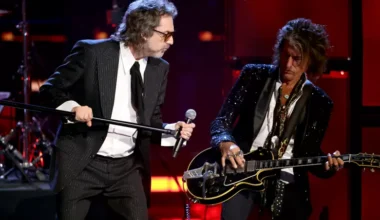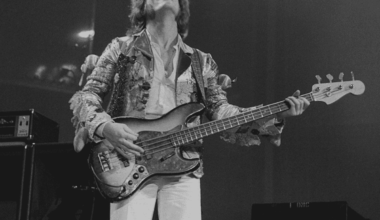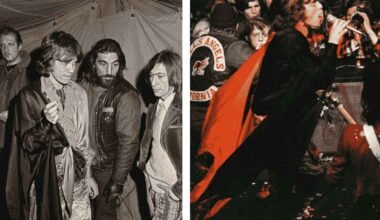It’s easy to overlook how monumental Mark Knopfler and Dire Straits became in the mid-1980s. Their smooth yet gritty combination of blues-inspired songwriting and pub-rock flair quickly drew a loyal fanbase, with tracks like “Sultans of Swing” from their debut album cementing their place in rock history and still enjoying heavy rotation on classic rock stations.
As they gained success, Dire Straits grew into more intricate arrangements, ultimately achieving monumental acclaim with the 1985 album Brothers In Arms.
This record blended modern digital production techniques with Knopfler’s trademark soulful touch, bringing a whole new level of polish to their sound. The album was a massive hit, aided in no small part by the groundbreaking CGI-laden video for “Money for Nothing,” which became an MTV mainstay.
For Knopfler, the path to this unique blend of innovation and classic feel started with his early influences. He grew up on staples like The Beatles, The Rolling Stones, and The Kinks, often citing the soulful sounds of early R&B legends like Muddy Waters as the basis for his bending, melodic guitar style. However, it was folk icon Bob Dylan who made the most lasting impression on Knopfler as a songwriter.
In a 1984 interview with Guitar Player, Knopfler spoke on Dylan’s creative brilliance: “Bob’s musical ability is limited, in terms of being able to play a guitar or a piano. It’s rudimentary, but it doesn’t affect his variety, his sense of melody, his singing. It’s all there.
In fact, some of the things he plays on piano while he’s singing are lovely, even though they’re rudimentary. That all demonstrates the fact that you don’t have to be a great technician.”
While Knopfler’s own guitar prowess is widely admired, he strongly believes in prioritizing emotion over technical perfection. “It’s the same old story: If something is played with soul, that’s what’s important,” he explained. “My favorite records aren’t necessarily technical masterpieces, though I admire players like Chet Atkins. But just listen to a Howlin’ Wolf album—that’s pure soul.”
Knopfler’s admiration for Dylan’s “soul” over technical skill caught the folk singer’s attention as well. When Dylan was working on his 1983 album Infidels, he initially wanted to produce it alone but eventually reached out to Knopfler for his technical expertise and sensitivity in the studio.
Reflecting on that experience, Knopfler said, “Each song has its own secret that’s different from another song, and each has its own life. Sometimes it has to be teased out, while other times it comes quickly.
There are no rules in songwriting or producing. You have to be sensitive and flexible, and it’s fun. I was probably more disciplined, but Bob’s an absolute genius with words. The music serves as a vehicle for that poetry.”
Knopfler’s description of Dylan’s music as “a vehicle for poetry” encapsulates his approach to making music—balancing technical innovation with raw emotional honesty. This philosophy helped create the timeless, soulful sound that defined Dire Straits, drawing inspiration from Dylan’s unrefined genius and bringing his own sensitivity to the recording process.







